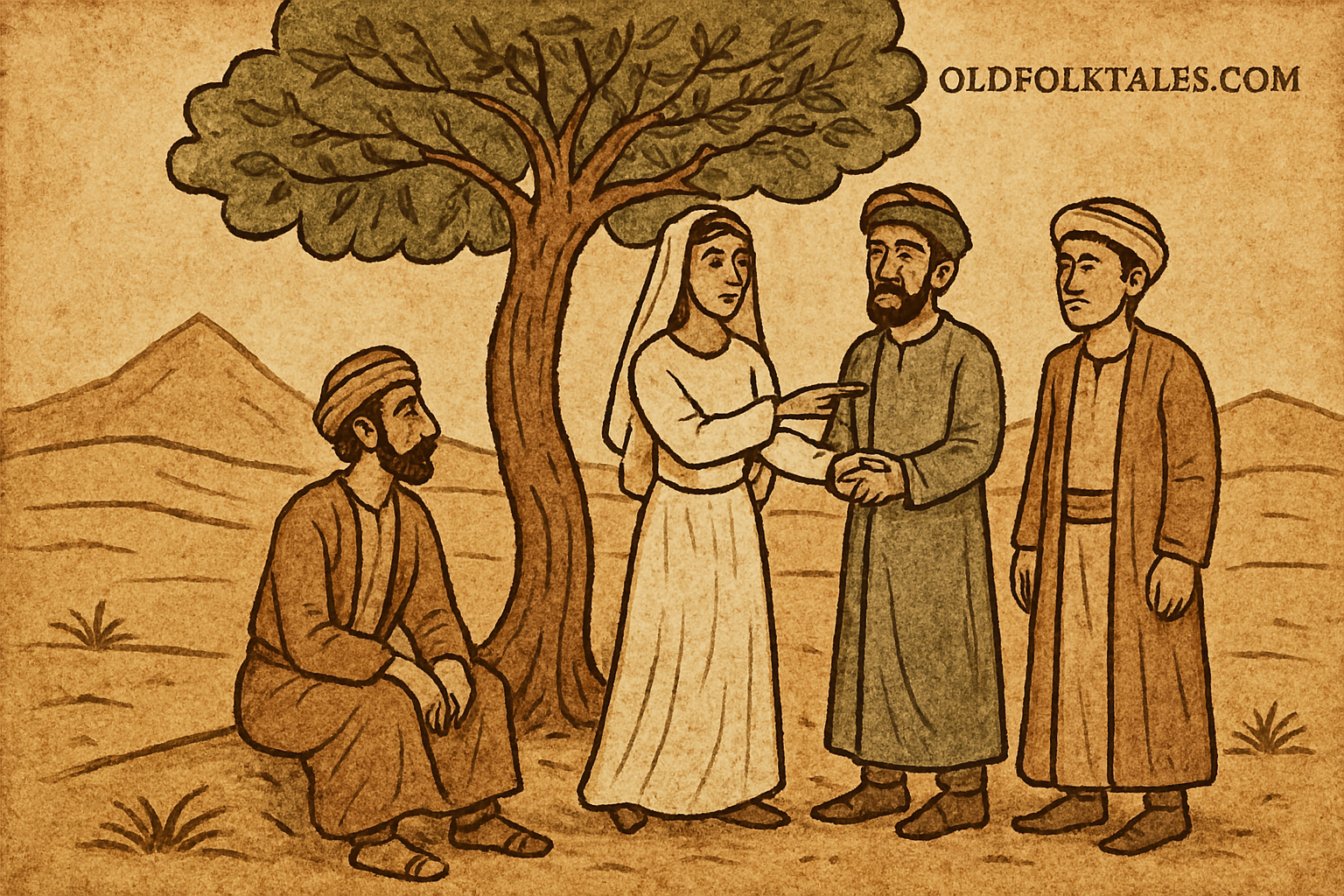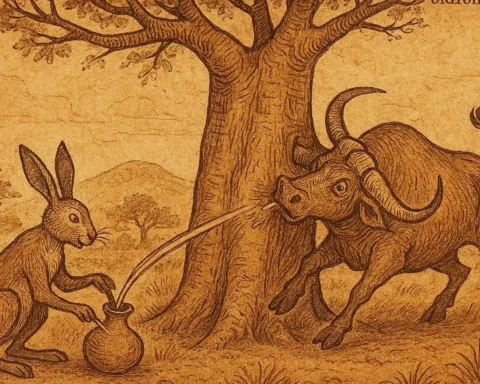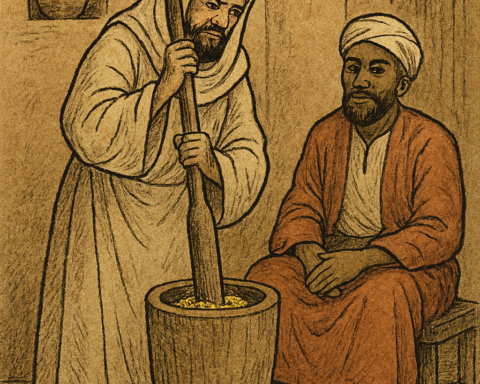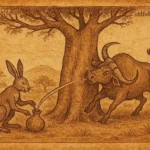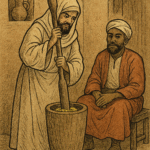In the bustling marketplace of an ancient Middle Eastern city, where merchants called their wares beneath colorful awnings and the scent of cardamom and cinnamon filled the air, there lived a young man whose heart burned with passionate love. The object of his affection was a beautiful and intelligent girl from a respectable family, but their love faced an insurmountable obstacle her parents adamantly refused to bless their union.
The young man was handsome enough, with kind eyes that sparkled when he looked upon his beloved, but perhaps he lacked the wealth or social standing that her family desired for their daughter. Night after night, he would pace beneath her window, composing poetry in his mind and dreaming of the day they could be together as husband and wife.
The young woman, equally smitten and weary of her parents’ stubborn refusal, finally made a bold decision. “If they will not give us their blessing,” she whispered to her lover during one of their secret meetings, “then we must seek it elsewhere. Let us elope and find a sheikh who will marry us according to the holy laws.”
The plan was dangerous but simple. They would slip away under cover of darkness and travel to a distant village where a learned sheikh could perform the marriage ceremony. The young man’s heart soared with joy, but he was also practical enough to know that such a journey required careful planning.
“I will bring my dearest friend as our witness,” he told her. “He is loyal and trustworthy, and every proper marriage needs a best man to stand beside the groom.”
His friend was indeed a remarkable man quick-witted, observant, and possessed of a subtle intelligence that allowed him to understand not just words, but the meanings that lay beneath them. Where the groom was earnest and straightforward, the best man was perceptive and intuitive, able to read between the lines of conversation like a scholar reading ancient texts.
On the appointed night, when the moon hung like a silver coin in the velvet sky and the city slept peacefully behind its walls, the three companions set out on their journey. They walked through the cool night air, their footsteps muffled by the sand, while above them countless stars bore witness to their brave endeavor.
The desert landscape stretched endlessly before them, painted in shades of silver and deep blue by the moonlight. They walked steadily through the night, speaking in hushed tones and sharing their hopes for the future, until the first pale fingers of dawn began to paint the eastern horizon with streaks of gold and rose.
As the sun climbed higher and bathed the world in warm morning light, the young woman felt the pangs of hunger stirring in her belly. But being a lady of refinement and discretion, she did not wish to complain directly about their lack of provisions.
“Let us have breakfast,” she said delicately, her voice carrying a hint of expectation.
The groom looked around at the barren landscape, confusion creasing his brow. Not a single date palm or fig tree was visible for miles, and their hasty departure had left no time for packing food.
“Why?” he asked with genuine puzzlement. “You know there’s nothing here to eat.”
But the best man, whose sharp mind caught the subtle nuance in her words, immediately understood her true meaning. A smile of comprehension crossed his face as he realized she was speaking in the refined manner of well-bred ladies who never spoke too directly of bodily needs.
“No,” he said gently, “the lady means we should brush our teeth, which is a kind of breakfast ritual. We have nothing to eat, but we can at least refresh ourselves properly.”
The groom turned to his beloved with wonder in his eyes. “Really? Is that what you meant?”
“Yes, of course it was,” she replied, though her tone carried a note of impatience that the best man noticed but the groom missed entirely.
This was her first test, and already she was beginning to evaluate the two men who accompanied her.
They continued their journey as the sun rose higher, transforming the cool morning air into the blazing heat of midday. The relentless sun beat down upon them, and exhaustion began to weigh heavily on their shoulders. When they could walk no further, they sought shelter beneath the spreading branches of an ancient acacia tree.
“We’re tired. Let’s rest,” the young woman announced, grateful for the blessed shade.
All three companions settled beneath the tree, but while the girl and the best man immediately removed their shoes to allow their feet to breathe and truly relax, the groom remained fully dressed, his feet still confined within his leather sandals.
“Take a rest!” the girl said pointedly, hoping he would understand the implication.
“But I am resting!” the young man protested, genuinely confused by her continued instructions.
The girl’s heart sank a little as she thought to herself, “How can he be so obtuse? How can anyone rest properly with shoes binding their feet?” But she maintained her composure and said nothing aloud.
Once again, it was the perceptive best man who bridged the gap of understanding. “The lady means you should take your shoes off,” he explained patiently, “because you cannot rest properly with them constraining your feet.”
The groom looked down at his feet as if seeing his shoes for the first time, then quickly removed them with an embarrassed laugh.
By late afternoon, their journey brought them to a small village where the inhabitants, following the ancient customs of hospitality, invited the weary travelers to share their evening meal. The villagers prepared a feast of roasted meat, flatbread, and dates, and the three companions ate gratefully after their long day of walking.
When the meal was finished and their hunger satisfied, the young woman felt the need to clean her teeth of the meat fibers that remained, but again she chose to speak indirectly rather than mention such a mundane matter explicitly.
“Let’s pull out the remaining meat,” she said delicately.
The groom stared at her in complete bewilderment. “What? What do you mean?” he asked, his voice rising with frustration at yet another cryptic statement.
Inside, the girl’s heart grew heavy with disappointment. “How can this man be so lacking in understanding?” she thought sadly. “How will he comprehend the subtle communications that are so important in marriage?” But outwardly, she maintained her dignity and said nothing.
The wise best man, however, had already grasped her meaning. He quietly picked up a small twig from the ground and began to use it to clean his teeth, removing the bits of meat with practiced efficiency.
“This is what she means,” he explained to the confused groom, demonstrating the proper technique.
“Oh really?” said the young man, his voice tinged with embarrassment. “Is that what you mean? I didn’t understand.”
“You don’t understand anything,” the young woman said, and this time her disappointment was clearly audible in her voice.
Finally, as the stars began to appear in the darkening sky, they reached the village where the learned sheikh waited to perform the marriage ceremony. The holy man had prepared his scrolls and assembled the necessary witnesses, expecting to unite the young couple in sacred matrimony.
But when the moment came for the bride to take her vows, she shocked everyone by stepping back and shaking her head.
“I don’t like this man,” she declared, her voice clear and firm. “I want to marry his friend instead, if he will have me.”
The groom stood frozen in disbelief, his dreams crumbling around him like ancient parchment. The best man looked equally surprised, but there was a glimmer of understanding in his eyes as he realized that the entire journey had been a series of tests – tests that he had passed while his friend had failed.
And so it was that the wedding ceremony proceeded, but with a different groom than originally planned. The young woman had found her true match not in the man who had first captured her heart, but in the one who had proven capable of understanding her mind.
Moral Lesson
This Middle Eastern folktale teaches us about the importance of understanding and compatibility in relationships. The story warns that intelligence, perception, and the ability to truly understand one’s partner are more valuable than mere passion or physical attraction. It also offers practical wisdom: when choosing companions or groomsmen, select those who will not overshadow you, lest they win the very prizes you seek for yourself.
Knowledge Check
Q1: What were the three tests the bride gave during the journey in this Middle Eastern folktale? A1: The three tests were: asking for “breakfast” (meaning teeth brushing), telling them to “rest” (meaning remove shoes), and wanting to “pull out the remaining meat” (meaning clean teeth with a twig).
Q2: Why did the bride’s parents refuse the marriage in this folktale? A2: While the story doesn’t specify exact reasons, it suggests the groom lacked the wealth, social standing, or family approval that the bride’s parents desired for their daughter’s marriage.
Q3: What qualities did the best man demonstrate that the groom lacked? A3: The best man showed perceptiveness, intuition, and the ability to understand subtle communication and implied meanings, while the groom was literal-minded and failed to grasp indirect speech.
Q4: What does the bride’s indirect way of speaking symbolize in Middle Eastern culture? A4: Her indirect communication represents the refined, dignified manner expected of well-bred women who avoid speaking too directly about bodily functions or personal needs, requiring intelligence to interpret properly.
Q5: What is the main lesson about choosing companions in this folktale? A5: The story teaches that one should choose friends, best men, or companions who are less clever, handsome, and rich than oneself, to avoid being overshadowed or having them win what you seek.
Q6: How does this tale reflect traditional Middle Eastern values about marriage? A6: The story emphasizes that successful marriage requires intellectual compatibility and deep understanding between partners, valuing wisdom and perception over mere romantic attraction or physical appeal.
